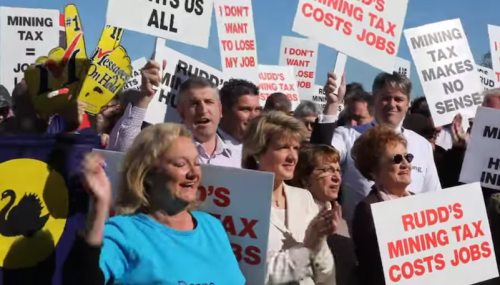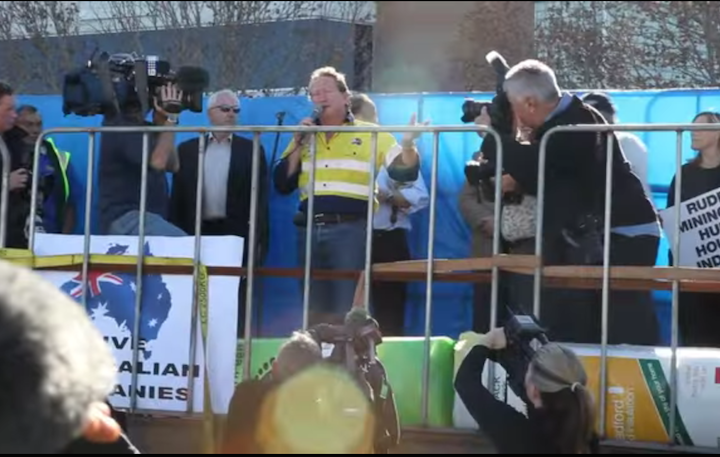All of sudden, broadening the GST is back on the agenda. But where is the hysteria that accompanied the mining and carbon taxes, asks Ben Eltham.
It’s a measure of the looking-glass optics of Australian politics in the wake of Tony Abbott that, all of a sudden, the fiscal debate has moved suddenly to taxation.
This week’s political news cycle has been set by Nationals backbencher David Gillespie, who asked the Parliamentary Budget Office to model raising the Goods and Services Tax to 15 per cent, and eliminating all its exemptions.
And yet, despite that dreaded three-letter acronym, this week’s conversation has featured little of the shrill criticism we saw directed at the carbon and mining taxes.
Can tax really be back on the agenda, and apparently debated in sensible, moderate tones?
The results of Gillespie’s “New Zealand-style” GST proposal are impressive. According to the PBO’s analysis, raising and extending the GST would raise an extra $65 billion in the 2017-18 financial year – effectively doubling the GST revenue take in that year.
The revenue windfall would comfortably solve the medium-term fiscal problems of the states and territories, which are currently screaming about the threat to their budgets posed by the $80 billion of scheduled funding cuts to health and education about to flow through from Joe Hockey’s horror 2014 budget.
Of course, raising the GST in such a fashion is no trivial undertaking. In addition to the rate rise from 10 to 15 per cent, the consumption tax would suddenly apply to all sorts of things it hasn’t applied to before: fresh food, health, education, financial services (though not, apparently, to residential rents).
For education and health, in particular, these would be highly controversial, as would the rise in the rate itself.
The equity implications are dramatic. The poorest in our society would unquestionably be hit hardest by such a tax hike.
Consumption taxes are inherently regressive: poorer Australians spend more of their weekly income on essentials than the well-off. Broadening the base would also hurt low-income households, by levying GST on things like private rent and groceries for the first time. In contrast, wealthier taxpayers would be far less affected. Much of their consumption already taxed. In addition, far more of their income is devoted to saving (for instance, in superannuation).
But there’s no doubt the government is flying a kite on GST. It’s an attempt to seize the tax agenda as an issue, and in doing so, retain the political initiative that Turnbull has so effortlessly captured since his ascension to the prime ministership.
The handy thing about kite-flying is that it allows the government to manage the debate. Gillespie appeared to be given free rein by the Prime Minister’s Office to brief media about his GST research – something that would never have been sanctioned under Peta Credlin.
After Gillespie announced the PBO’s findings, Scott Morrison hosed them down as a worthy research exercise, but at the “extreme end” of the government’s possibilities.
Then Malcolm Turnbull pushed the issue along, telling reporters that he “welcomed” Gillespie’s efforts, comparing them to his own tax reform paper issued when he was a Howard government backbencher in 2005 (which, incidentally, infuriated Peter Costello at the time).
“I want to compliment David for raising those issues,” Turnbull remarked, in characteristically emollient tones. “I did something myself when I was a backbencher some years ago, and I think it’s really important that we get lots of ideas out there and lots of discussion, but it’s premature to say that the Government has landed on one particular change or another.”
Turnbull moved the debate right along to fairness. “Any changes to the tax system have got to be ones that ensure that there is no disadvantage to the most vulnerable Australians, to less well-off Australians.”
You can see what he’s doing here: taking a GST rise as a given, and moving straight to the subsequent debate over compensation. The government is trying to frame a Goods and Services Tax increase as a fait accompli – a sensible and prudent move that safeguards government services. There is every sign it could succeed.
Labor strategists must almost be choking at the gall of it. Turnbull and the Coalition are suddenly throwing the switch to revenue, after six years of pretence that Australia’s budget problems are all on the spending side.
For those of us who covered the carbon and mining taxes during the Rudd-Gillard years, the contrast is dramatic.
The carbon tax debate began life as a reasoned and evidence-based debate about appropriate measures to address greenhouse gas pollution. It was quickly captured by vested interests in a classic scare campaign, spearheaded of course by Tony Abbott. Despite early support for the idea of doing something about climate change, the generalities of the carbon debate were soon overwhelmed by an irrational tabloid campaign that successfully mobilised populist anti-tax sentiment.

“Axe the tax!” was the war cry of the day, and the message cut through. Climate politics was successfully (and inaccurately) reduced to a cost-of-living scare campaign. The Coalition skilfully jumped on the coincidental spike in electricity bills caused by network gold-plating to paint the carbon tax as a monster that would destroy the economy and wipe the regional city of Whyalla “off the map.”
The hatred of the carbon tax was also irrevocably skewed by Julia Gillard’s broken promise that “there will be no carbon tax under the government I lead.” Again, Tony Abbott skilfully exploited Gillard’s blunder to colour the carbon debate in lurid hues of sexism and betrayal.
Sensible discussion of the utility and purpose of carbon pricing was derailed for half a decade, to the despair of environmentalists and policy elites.
The mining tax debate was just as overwrought. Just weeks after the Rudd government unveiled the proposal, the mining industry swung into action with a $20 million advertising campaign, “flooding the channels” in the spinmeisters’ phrase. The saturation bombing campaign thoroughly spooked Labor faction bosses, and contributed to Rudd’s catastrophic loss of caucus support in June 2010.
The Abbott government followed through (unlike so many of their pre-election promises), abolishing both the mining tax and the carbon permits system.
But the ascension of Turnbull, and the complete reset of media sympathies and opinion poll metrics, gives the government room to move on tax policy.
The political opportunities are tantalising. The playbook here is probably copied from Mike Baird, who successfully presented himself as a centrist moderate at the 2014 New South Wales elections. Baird did this, in part, by campaigning strongly on the supposedly unpopular policy of electricity privatisation.
Labor should be very worried about this development. The dominant fact of fiscal policy in Australia is that the government requires more revenue. Labor above all should realise this, as welfare states don’t come cheap. If Labor ignores any effort to repair Australia’s tax revenues, it risks ceding the policy space to the Coalition, with potentially disastrous consequences.
Under Bill Shorten, the Opposition has pointedly refused to come up with any meaningful tax reform policies. We know a little bit about their views on superannuation tax concessions. But we still don’t know, for instance, if Shorten intends to reintroduce carbon emissions permits. Labor can’t even commit to the most obvious political target for a new tax – one that it will plainly need to introduce for environmental reasons anyway.
Instead, Labor seems to be gearing up for a fight on the GST – a fight that it thinks it can win. Labor’s Chris Bowen was out and about yesterday, telling journalists at a doorstop that “of course we will oppose it.”
Bowen called on Treasurer Scott Morrison to “come clean.”
“Tell them now and we will have a proper debate across the country, one the Labor Party will not shy away from one little bit.”
Can Labor win a GST debate? That’s a very interesting question.
On the policy fundamentals, the playing field favours Labor. It’s a hip-pocket issue that anyone can understand. It will be unfair. And there are better ways to raise revenue, for instance by taxing pollution and by taxing high-income earners more.
But in the cut-and-thrust of political combat, Labor might struggle. Bill Shorten is struggling as Opposition leader matched up against Turnbull, and Chris Bowen is no superstar either. The Opposition’s fate may well depend on the actions of others, such as trade unions and community groups. If a broader community backlash breaks out against a Turnbull GST, Labor might be able to capitalise. You wouldn’t bet on it, though.
Donate To New Matilda
New Matilda is a small, independent media outlet. We survive through reader contributions, and never losing a lawsuit. If you got something from this article, giving something back helps us to continue speaking truth to power. Every little bit counts.





